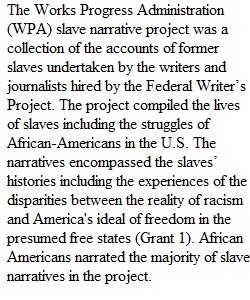


Q *I have modified this assignment due to the short nature of our course and will count this as your third essay. Please click the link below to see the video about this assignment: https://youtu.be/iTtqUtFDPG4Links to an external site. You will need to view the following video in its entirety. It is a little over one hour long, so you will need to set aside time to view it and also to analyze it in your essay. I highly recommend taking notes and writing down the names and dates of the interviewees as they appear so you can add them to your essay. You will not need to cite the video in MLA format, but you will need to put any words that are not your own and directly from the video in quotations and give credit to the person who said them. For instance, if you quote one of the slave narratives; please put the quote in quotations and credit their name in parentheses behind the quote. Make sure you completely address the essay components and view the rubric to see how you will be graded. I have been notified that the link to the video I posted below (from Cornell) is not working. Thank you to Peter for finding the video via YouTube. Please click on the link below and let me know if you have any questions. https://www.youtube.com/watch?v=e9a4cL3YtIoLinks to an external site. LinkLinks to an external site. https://guides.library.cornell.edu/tubman/narrativesLinks to an external site. Your essay will need to address the following parts of the video. You will also need to include direct information/quotations/stories from at least 3 of the slave narratives that appear throughout the video. Make sure you include the name of the person, their age, and where they were from/location of interview when you reference them. Your paper needs to be at least 700 words in length and should fully address the following components: 1. Begin your essay by briefly addressing what the WPA slave narrative project was, who participated in it (can note how many former slaves were still living at the time of the project), who completed the interviews and how the former slaves felt about being interviewed. 2. Below you will find a list of topics covered in the video. You will need to address at least 5 of these topics and answer the analysis questions about your selected topics. Make sure you also include at least 3 of the slave narratives in your analysis (make sure to include the name, age, and location/prior living location in your essay). 1. Education 2. Work, 3. Punishment 4. Role of race/mixed race/master fathering children, rape 5. Religion, spirituality, song, funerals 6. Living accommodations,Feelings towards whites (good, bad, in-between) 7. Patty rollers (patrols), passes, autonomy 8. Marriages 9. Slave trades and escape 10. Civil War, Emancipation Proclamation, service to the Union (how many slaves/former slaves served as union soldiers) 11. End of war and freedom granted For your 5 selected topics (I recommend dividing them into five paragraphs) and addressing the following questions: What was a typical slaves experience regarding your topic? (can bring in (quote) a slave narrative as an example) What is your reaction to learning about this topic? Did you already know this happened, did you just learn this happened? How does it make you feel? Compare and/or contrast at least one part of this topic and/or their story/narrative to a part of slavery you have studied from the Hollitz Chpt. 10 textbook and any relevant information from Gorn chapters 11 and 12. You will need to include specific quotes/references from our textbooks (please cite in MLA format). How is the slave narrative similar or different to what you have already learned in the textbooks? What lesson or take away have you learned by looking at this topic of slavery? How has it changed or expanded your view of slavery? Overall conclusion- in a paragraph wrap up your main ideas about the topics and slave narratives you addressed and the overall take away/lesson from viewing this video project. *Remember to view the rubric and to let me know if you have any questions.
View Related Questions